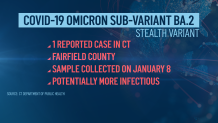The first case of the COVID-19 omicron sub-variant BA.2 also known as the "Stealth Variant" has been detected in Connecticut.
Infectious disease experts tell NBC Connecticut the name comes from the fact that sometimes the variant can be hard to detect when testing.
The BA.2 variant is potentially more infectious than the Omicron BA.1, according to those experts.
The BA.1 omicron variant led to a spike in cases last month into the new year.
329 medal events. 32 sports. Endless drama. Catch all the action at the Paris Olympics. Sign up for our free Olympics Headlines newsletter.
According to the Department of Public Health, there is at least one reported case of the "stealth omicron" variant, which was detected in a patient in Fairfield County. The sample was collected back on January 8.

"What we are going to be doing over the next several weeks is really watching very closely at our numbers, looking at whether additional variants are identified of this particular subset," said Department of Health Commissioner Dr. Manisha Juthani. "This particular BA.2 isolate that was from Fairfield County and earlier in the month of January. Since then, that time we have not had others identified as of yet that does not mean that there haven’t been other cases that have not been sequencing.”
Local
Dr. Juthani tells NBC Connecticut the state is in a good position to deal with the variant.
"We are masking, we are testing, we are getting people vaccinated and boosted," said Dr. Juthani said. "Our situation is improving in terms of how we deal with this virus."
But Dr. Juthani, along with other health experts, says that it's still early to determine how this variant is different from Omicron BA.1.
"Right now there’s no evidence that’s been noted by credible scientist that this new variant is more virulent, that it’s vaccine resistant, all of those kind of big questions that we asked of the scientific community when there’s a new variant,” said Dr. Anthony Santella, a University of New Haven Health Administration and Policy professor. "This is not something that is unheard of or unique to the COVID pandemic, the real question is how impactful is it on it on human health.”
Wastewater is another way that the Department of Public Health along with other state partners like Yale University have used to pinpoint where the virus is coming from in the community.
“We will be monitoring wastewater levels of the virus to be able to help give us a sense of if anything is changing in our communal assessment of the virus," said Dr. Juthani. "The CDC has also identified Bridgeport and Waterbury as two sites where they’re going to have wastewater testing going live for reporting starting tomorrow.”
Bobby Abate is a retired Hartford Public School teacher who tells NBC Connecticut he retired because of COVID-19 to protect himself and loved ones.
"We had a variant and then we had another variant and now there's another one, I don't know when this is going to stop," said Abate. "35 years of working and it's messing up my retirement plans because I like to get out and see people and do things but you're limited as to what you can do while trying to protect yourself."
Dr. Santella tells NBC Connecticut we could see fewer mutations if the public health measures are followed along with a rise in vaccination rates and booster shots for those eligible.
"The more we kind of hunker down and be compliant with those public health mitigation strategies, the less likely, the virus is to mutate, change and continue to impact human health in terms of cases, hospitalizations," said Dr. Santella.



